Guinea
Young supporters of Guinean opponent Cellou Dalien Diallo, who has declared himself the winner of the presidential election, clashed with police on Wednesday in the Wanindara district of the country's capital Conakry.
African election monitors said Tuesday that Guinea's weekend election was conducted properly, but the political opposition to incumbent Alpha Conde, which has already claimed victory, dismissed it as fraudulent.
Preliminary results for four of the country's 38 voting districts released by electoral commission chief Kabinet Cisse late Tuesday showed a strong lead for Conde over his main challenger Cellou Dalein Diallo, who had claimed victory Monday.
In three of the four districts, Conde secured more than the 50 percent needed to avoid a runoff vote, although an electoral commission official told AFP it was "impossible to extrapolate" to the final national result, expected later this week.
"Alpha Conde is doing everything possible to change ballot-box results in his favour" Diallo's campaign director Fode Oussou Fofana had earlier told reporters in the capital Conakry.
The opposition campaign has been setting the stage for an election dispute, with Fofana accusing the government of "large-scale fraud" in counting ballots from the hotly contested October 18 poll.
Conde, 82, is seeking a controversial third presidential term, a move that has triggered months of deadly unrest in the West African nation.
- Augustin Matata Ponyo, the African Union's head of mission in Guinea, said the ballot took place "in transparency" while the head of the West African ECOWAS monitoring mission said the vote was lawful.
Celebrations in Conakry of Diallo's self-proclaimed victory quickly descended into violent clashes with security forces, in which several youngsters were shot dead, opposition officials said.
Meanwhile in a seeming response to Diallo's self-proclaimed win, security forces dressed in riot gear surrounded his house in the capital. He tweeted that he was trapped inside.
- 'Irresponsible and dangerous' -
Security forces killed dozens of people in protests against a Conde third term, which began in October last year--.
Although polling day was mostly calm, Diallo's self-proclaimed election victory has ratched up tensions in the former French colony of some 13 million people.
The government insists the vote was fair and that only the official electoral authority can declare the results.
Conde's RPG party also called Diallo's move "irresponsible and dangerous" on Monday.
The international community is concerned too. The United Nations, African Union, and the 15-nation ECOWAS called the premature declaration of results "regrettable", in a joint statement on Monday.
"This state of affairs is not conducive to preserving calm," the statement said.
But on Tuesday, the communications director for Diallo's UFDG party, Ousmane Gaoual Diallo, said the party's own analysis of polling data collected from individual stations showed the opposition leader had won over 50 percent of the votes.
The official polling-station reports sent to the electoral authority are "completely different" to the actual results, he told AFP.
Twelve candidates are vying for the presidency, but Conde and Diallo are the frontrunners.
- 'Chaos' -
Guinea's government said in a statement Monday that the opposition "clearly intended to create chaos and to call into question the real results".
Much of the deep opposition to Conde stems from his bid for a third term.
He pushed through a new constitution in March which he argued would modernise the country. But it also allowed him to bypass a two-term limit for presidents.
After decades as an opposition activist, Conde became Guinea's first democratically elected president in 2010 and he won again in 2015.
Rights groups now accuse him of veering towards authoritarianism, however.
Diallo was formerly a prime minister under authoritarian leader Lansana Conte.
He unsuccessfully challenged Conde in both 2010 and 2015, in elections his party activists are convinced were rigged.
- Second round -
An acrimonious political campaign in the run-up to the vote saw Conde and Diallo trade insults, as well as violent incidents break out in some parts of the country.
The campaign also raised the spectre of ethnic strife, with Conde accused of exploiting divisions for electoral ends -- a charge he denies.
Guinea's politics are mainly drawn along ethnic lines: the president's base is mostly from the ethnic Malinke community and Diallo's from the Fulani people.
A second round of voting, if needed, is scheduled for November 24.




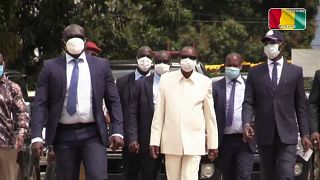
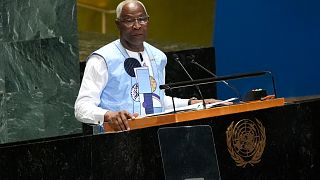
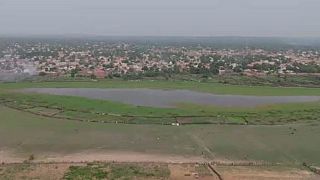
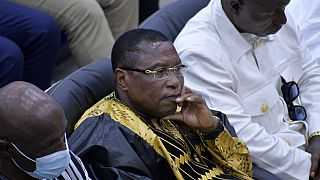
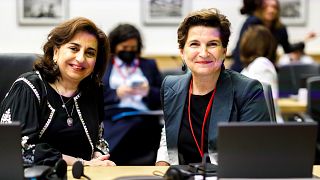


Go to video
Syrian forces deploy in Damascus suburbs after two days of clashes
01:08
South Sudanese police impose nationwide nighttime curfew after deadly riots
00:50
Conakry at a standstill amidst opposition protests
Go to video
Clashes erupt between Somalia's federal troops and regional forces over a disputed local election
01:10
More than 135 killed in Guinea stampede despite official figure of 56
00:56
Gunfire reportedly erupts in Conakry; Guinea's military junta calls reports 'fabricated'